Three more future forms (+ 1)

Before we begin
If you haven't followed the guide to four future forms yet (or not for some time) you are advised to look at it before you read on (new tab).
This guide explains three tenses often taught to higher-level
learners which are slightly less common ways to talk about particular
aspects of the future. If you are unsure about the distinction
between aspect and tense,
there's a guide on this
site, linked below in the list of related guides
The other distinction to make sure you are clear about is the difference
between stative and dynamic uses of verbs. If you
are unsure, there's a
guide on this site also linked below
This guide also includes an explanation of a fourth common way to talk
about the future which is rarely taught but easy to teach and learn:
We are about to begin.
 |
The future progressive |
There are four uses:
- the future as 'a matter of course' 1
The sentence
They will be having dinner so don't call them now
implies that the action will be happening in the natural course of things and your call would interrupt it. The form doesn't always denote a progressive action but it usually does. The best way to explain this is probably with the use of a time line such as
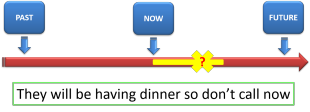
This form is also used to refer to a continuous background state which may not actually be an event in progress at the time to which the speaker refers.
For example:
They'll be staying in a hotel for a while
refers not to where the people in question currently are but to a background continuous situation ongoing from the present. - the future as 'a matter of course' 2
The second example
She will be catching the train to work while her car's in the workshop
does not imply a progressive action. It implies a repeated future action because the verb in this sense cannot be seen as progressive; it is an instantaneous or momentary verb unlike, e.g., verbs such as work, read, study etc. which have a durative sense.
A time line to show the concept might be
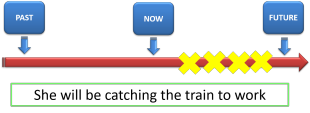
It can also imply that this is a new arrangement rather than a one-off event and that fact is often signalled by an adverbial (a clause expressing reason in the example above) or a prepositional phrase as in, e.g.:
She'll by working from the office upstairs from next Monday. - A current speculation
This is the modal use of the auxiliary verb will which refers to the speaker's view of whether an event is likely to be true. It is, to use the technical term, and example of epistemic modality and does not refer to the future at all. An example is:
I expect she'll be sitting on the train to work
The use of an introductory verb or clause such as I expect to increase or tone down the certainty shown is commonplace so we may also have:
I suspect she'll be be sitting on the train to work
Other modal auxiliary verbs and expressions may be added to the mix to signal very subtle shades of perceived likelihood as in, e.g.:
She may / might well be / must / could be sitting on the train to work
and so on.
A time line for this will show that the present is included in the speculation, like this:

but is also shows that the speaker is uncertain how long the state will persist. - tact and diplomacy
the form is often used to sound tentative and polite. Compare:
The left-hand examples can sound peremptory and even rude but the use of the progressive form softens the nature of the question and makes it sound much more polite.Will you come at 6? Will you be coming at 6? When will she install the new software? When will she be installing the new software?
This is somewhat subtle so you'll need to set the context and role relationships clearly if you are teaching the use. It does, however, follow a general rule that more complex forms often imply more distance or politeness.
 |
The future perfect |
Task 2: Make a note of what you understand the three different but closely connected uses of this tense are. Click here when you have done that.
| He'll have finished the book by the time I want it |
| He'll have repaired the car and then we can use it |
| I'll have been at the hotel for a day or two before I can call you |
- Use 1: He'll have finished the book by the time I want it
- The tense is used to make it clear that
one event or state precedes another. As with the past
perfect-past simple distinction, it is not always necessary to use the tense
forms like this if the ordering is clear. For example, it would be
equally clear if one said:
He'll finish the book soon and then he'll let me have it. - Use 2: He'll have repaired the car and then we can use it
- This is clearly similar to Use 1 in the sense of ordering the
activities but the distinction is that one event or action
depends on another. We
can't use the car until it is repaired and the
speaker makes this clear by the use of the perfect form. It is not
dissimilar to the use of the present perfect in, e.g.:
When he has repaired the car, we can use it
except that the present perfect implies that he is working on the car now. The future perfect can show that but it isn't necessary. - Use 3: I'll have been at the hotel for a day or two before I can call you
- Another similar use to the first example but the speaker's implication here is a state will be in being before a subsequent event occurs. This use is confined to verbs which do not normally occur in the progressive aspect like, be, have, like, understand etc. See the guide to stative and dynamic verb uses, linked below, for more.
Whichever use we consider there is an overriding concept of
looking back from a point in time after now and considering what has
happened. Any time line needs clearly to show the point of
view of the speaker / writer. As in, e.g.:
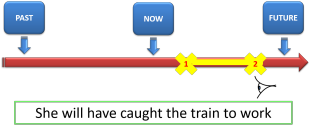
in which the future event is denoted by the figure 1 and the point
in the future when it is being considered by the figure 2.
 |
The future perfect progressive |
Bear in mind that this form can only be used with verbs used in dynamic senses so is not normally available for verbs such as be, have, think, live etc. except where those verbs have dynamic senses. See the guide to stative and dynamic verb uses, linked below, for more.
Task 3: Again, can you work out what the three uses are (they are closely connected to the uses of the future perfect simple)? Click here when you have an answer.
| I will have been working for over two hours before you get here |
| He'll have been travelling for ten hours and will be tired |
| We'll have been coming to this hotel for 15 years soon |
- Use 1: I will have been working for over two hours before you get here
- The tense is also used to make it clear that
one event or state precedes another.
The difference is simply that the speaker wishes to
emphasise the duration of the action.
Compare, e.g.:
I'll have been at work for over two hours before you get here
This is similar to Use 3 in the last list. The speaker is making it clear that a progressive action (rather than a state of affairs like being in a hotel) will occur over an extended period before a subsequent (quick) event occurs. It also implies that the progressive action may continue after the second event occurs.
A time line to show this sense might be:

- Use 2: He'll have been travelling for ten hours and will be tired
- This is clearly another example of where one
action or state causes or is dependent
on a previous one. Again, however, the speaker wishes to emphasise the duration of the action.
A time line for this is different because the action is not seen to continue after the state of being tired but to have led up to and caused it. It might look like this:

- Use 3: We'll have been coming to this hotel for 15 years soon
- This is what is known as an iterative form because the event is
repeated. In English, the iterative is often signalled by the
use of the progressive form of the verb. In other tenses, for
example, we get:
She's been telephoning repeatedly
Someone is banging on the door
etc.
Iterative (or repeated) events are signalled by the -ing form of the verb in English with what are known as instantaneous verbs such as break, bang, glance, hit etc. because semantically these verbs cannot describe a progressive action.
Other verbs which are by nature durative, such as read, live, stay, wait etc. when they appear with the -ing form denote progressive or background events rather than repeated events.
A time line for this example might be:

and from that can be seen that this use of the future perfect iterative carries with it the use of the perfect aspect to embed the past and the future events in a more distant future event. That is, for many learners, wholly non-intuitive.
There is a good deal more on the uses of these two tenses in the guide to speaking about the future.
 |
The problems |
There is one very obvious difficulty with the two perfect aspect
future tenses: the verb forms do not match the time to which they
refer. If we take, for example:
I will have finished it by the time you need
it
we can see that the first verb phrase, will have finished,
is clearly a future form of some sort but the second verb phrase is
simply need and that looks like a present form. It is
logical to assume that it should be will need and that is
what many learners are tempted to say. Many languages do
signal the time in this way and in that sense are more logically and
intuitively constructed.
This happens to be the way that tense forms work in dependent
clauses in English and is a source of a great deal of error.
There is a guide on the site to
tenses in dependent clauses that you can access here (new tab).
A second, even more serious, problem is that many languages do
not have a perfect or a progressive aspect which parallels how
English deals with signalling events embedded in other events (the
perfect) or events which remain in the background, are progressing
or repeated (the progressive).
Learning to handle the two aspects in English means, therefore, for
many learners learning as new and unfamiliar way of conceptualising
events in time.
Time lines a constant concept checking are both needed.
 |
Time lines |
As with many tense forms, the simplest way to present and help people to
understand is via the use of clear time lines.
We used some simple time lines above to show the separate uses of these
forms but they can, with a little preparation be made more elaborate
(and therefore clearer).
Here are some
examples for future perfect forms.
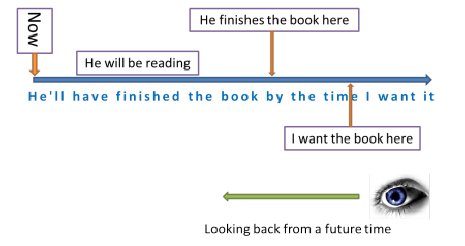
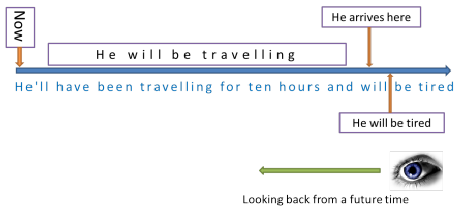
In all cases, the time line must show the speakers point of view or the meaning will not be clear.
 |
Avoidance and dialect |
Many native speakers of English, especially those using a North
American dialect rather than a British dialect, tend to avoid the
use of the future perfect forms so, instead of:
When will she have finished the work?
They will have arrived by six
I won't have done it by then
we may encounter either:
When will she be through with the work?
or
When will the work be finished?
and
They will be here by six
I won't be done by then
This is not a sound reason for avoiding teaching the forms but it should give some pause for thought in terms of how actively we want learners to use the forms.
 |
be about to |
This is the form used for imminent or nearly imminent futures. Unlike many forms, it carries no speaker perceptions other than
- it is going to happen very soon (The bomb's about to go off)
- it is almost certain to occur (I'm about to leave, I'm afraid, so I can't talk now)
The form carries no implications of, e.g., speaker intention (see a.) and does not denote futures based on present evidence (see b.). The form is very simple to teach and learn and more common than you may think. (Other forms such as be bound to, be certain to, be liable to, be likely to etc. do carry modal meanings expressing the speaker's point of view (certainty, characteristic behaviour, likelihood etc.).
The form is frequently used in the past to denote a thwarted or
failed intention as in, e.g.:
I was about to leave when the phone rang
She was about to start university when she got ill
(An allied form, often seen as more formal, appears in, for
example:
I was on the point of leaving when the telephone rang
which happens to be a direct translation of the standard form
in, for example, French, Spanish, Portuguese and Romanian and also
translates very closely in Dutch.)
| Related guides | |
| four future forms | which considers the simpler future tense forms |
| the tenses map | for the clickable diagram of all English tenses |
| the tenses index | for the index of all tense-related guides |
| aspect and tense | to disentangle the concepts |
| stative vs. dynamic | to disentangle two more concepts |
| using time lines | for some more ideas |
| speaking about the future | for a more technical guide to the area |
| time, tense and aspect | for a guide to all the tense areas of English |
